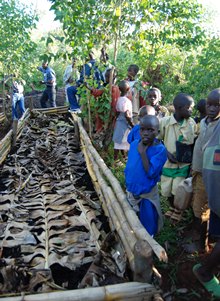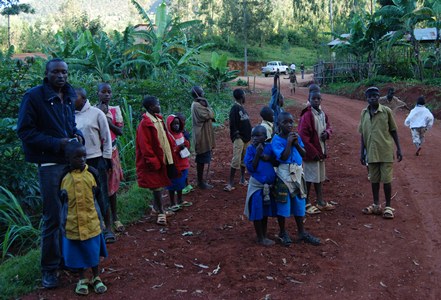
Integrating Coffee Agribusiness and Community Health Initiatives in Rwanda
Date
October 5, 2011
Author
(October 2011) Since the 1990s, Population, Health, and Environment (PHE) approaches have addressed the complex links between human health, environmental management, poverty, and population pressures in order to solve development problems in areas critical for biodiversity and natural resource management.
PHE projects traditionally work to increase access to family planning and health services while simultaneously helping communities manage their natural resources in ways that improve their health and livelihoods, as well as conserve critical ecosystems. A relatively new USAID funding mechanism—”wrap-around”—integrates health funds from the U.S. Agency for International Development (USAID) into existing economic growth, livelihood, and conservation projects. These wrap-around funds are helping to create a new generation of PHE projects.
The Sustaining Partnerships to Enhance Rural Enterprise and Agribusiness Development (SPREAD) Project is a five-year partnership (2006-2011) between Texas A&M University’s Norman Borlaug Institute of International Agriculture and USAID Rwanda. SPREAD’s agribusiness programs focus on: research and extension of improved agricultural and processing practices to increase coffee quality and quantity; cooperative and business development assistance for farmer cooperatives and private enterprises; marketing Rwandan coffee; and strengthening links between specialty coffee buyers and Rwanda’s coffee growers. Thanks to public-private partnerships, SPREAD has expanded to other high-value agricultural commodities such as pyrethrum, a daisy-like flower that thrives in northwestern Rwanda and is used to produce a natural insecticide.
Integrated Health Program

SPREAD staff describe how farmers are trained at the worm composting demonstration site.
Photo: Jason Bremner/PRB.
In addition to SPREAD’s Economic Growth funding from USAID, the project also has a community health component, utilizing funds from the President’s Emergency Plan for AIDS Relief (PEPFAR) for HIV prevention, and additional USAID money for Maternal and Child Health, and Population and Reproductive Health. The health program began in October 2008 in the coffee-growing areas of the Southern Province, and expanded to the pyrethrum-growing areas in the Northern and Western provinces in October 2009.
Health activities include behavior change communication and service delivery across various health topics in accordance with local needs and Ministry of Health key priority areas. Project agricultural extension agents are invited to act also as community health agents. These agents are trained to conduct health outreach, including education, community-based distribution of health commodities, and referrals to local health services during agricultural meetings and visits to farmers’ homes and fields. SPREAD’s health team also trained a network of youth and adult peer educators to conduct regular outreach and education activities among target farmers. One result was the creation of community theater troupes and a popular competition serving as a forum for dialogue around community issues involving coffee farming, family health, and well-being. In addition to basic health education, outreach sessions often involve discussions around family size and gender roles; how coffee revenue is used within households; and health issues such as violence and alcohol, family planning decisions, and HIV prevention and condom use.
Additionally, the project coordinates with local health centers to provide HIV counseling and testing and intestinal parasite treatment at coffee-washing stations during harvest season, where farmers bring coffee cherries daily for processing. Health staff facilitated relationships between coffee cooperatives and Population Services International (PSI) to stock and sell branded condoms and water purification solution at coffee-washing stations and administrative offices, and these products are also sold via peer educators and cooperative extension agents during outreach visits. To support water and sanitation messages, SPREAD also furnished supplies for clean drinking water and hand washing at coffee-washing stations and offices, and set up rainwater catchment tanks in pyrethrum growing areas, where potable drinking water is extremely scarce.
Wrap-Around Programs
SPREAD is one of a growing number of examples of wrap-around projects. Examples of other wrap-arounds in Rwanda include: Land O’Lakes Rwanda, which receives PEPFAR funds to integrate HIV and water and sanitation-related activities into their work with dairy farming cooperatives; and Family Health International’s collaboration with Wildlife Conservation Society and International Resources Group to promote an integrated community health, conservation, alternative livelihoods, and tourism project around the Nyungwe National Forest in southwestern Rwanda. This strategy of integrating USAID health money into livelihood and conservation efforts has also been experimented with in Tanzania, where a few conservation and coastal resource management partners are also integrating PEPFAR and family planning activities into their projects.

Children come out to greet visitors at a coffee-washing station supported by the SPREAD project.
Photo: Jason Bremner/PRB.
Successes
An evaluation of SPREAD’s health program revealed the benefits of an integrated approach. Due in large part to careful and consistent community engagement and efforts to enhance rather than duplicate existing services, local health officials and nongovernmental organizations appreciate the easy access to farmers that the cooperatives provide, especially to rural men, who are often difficult to reach with reproductive health interventions.
SPREAD’s agribusiness staff and coffee cooperative managers also understood the links between farmers’ health, coffee quality, and successful cooperatives, as well as the difference between simply increasing revenue and true improvement in quality of life. Project field coordinators noticed coffee growers’ households did not have inexpensive mosquito nets for malaria prevention, despite having the funds to buy them, and had seen households struggling with alcohol abuse and gender-based violence that sometimes accompanied men’s increased income. The health program, through its consistent dialogue, capacity building, and contact with farmers, was able to address some of these broader factors affecting agribusiness activities and farmers’ welfare.
The farmers themselves, and peer educators and health extension agents in particular, welcome and appreciate the services provided, citing increased knowledge and acceptance of family planning, HIV testing, and condom use, and positive changes in gender roles and resource use within themselves and their communities. The well-funded and structured nature of the health program and the network of health extension agents also add value to the agribusiness side. Coffee cooperative managers take advantage of regularly scheduled health meetings to discuss important topics they need to communicate to farmers, and the peer educators for health have become increasingly involved in strengthening coffee extension activities. The wrap-around health funds have been essential in achieving these results; it is unlikely that SPREAD would have addressed health issues otherwise.
Challenges
The implementation of the wrap-around activities, however, was not without challenges. SPREAD’s program designers were experts in agronomy and agribusiness, not health, so although health was included in the original USAID project proposal, the integrated health program was not fully established until a full two years after funding began, once health expertise was brought on board. This delay allowed only three years of fully integrated programming in the coffee areas and two years of integrated programming in the pyrethrum growing areas, a short amount of time to have a meaningful community impact while laying the foundation for the sustainable continuation of services.
These issues also meant that activities were not fully integrated from the project’s start, and the onus was on the health team to convince their agribusiness counterparts of the importance of the health program, and to encourage joint planning, combined field activities, and integrated monitoring and evaluation. Eventually, this collaboration became more routine as program coordinators understood the added value of the integrated approach. However, it would have been optimal to have the integration piece and collaborative relationships across agribusiness and health programs articulated from the beginning of the project and reflected in the project design, management structures, and monitoring and evaluation systems.
Lastly, each of the U.S. government funding streams—Economic Growth, PEPFAR, and other USAID health funding—also demands separate and cumbersome work planning and reporting systems, putting an enormous administrative burden on project staff. Efforts by donors to streamline work planning and reporting requirements for these types of integrated programs would be extremely helpful and allow limited staff to spend more time planning and coordinating efforts, developing innovative means of integrating services, delivering services in the community, and monitoring and evaluating efforts to improve interventions.
Linking family health, gender, agriculture, and business are key to sustainable livelihoods development. Encouraging innovative programs that combine agribusiness funding with broader health and social objectives are necessary for the success of any poverty reduction strategy. Donors and program designers can learn lessons from SPREAD and USAID’s other wrap-around efforts and focus on thoughtful multisectoral program design, consistent community outreach, and sound monitoring and evaluation systems to ensure that integrating programming continues to evolve and improve people’s lives and livelihoods.
Irene Kitzantides is the former Population, Health, and Environment Adviser for the USAID SPREAD Project, Rwanda.
